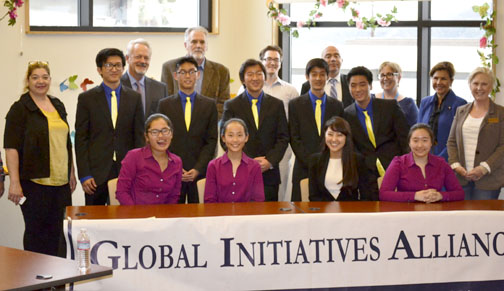
Local students (in yellow ties and red shirts) presented options to the Crescenta Valley Town Council on water conservation. Pictured with the council members are students (top row) Jason Choi, Kevin Park, Matthew Chung, Joshua Rhee, Minsoo Sung. Bottom row from left are Andie Chung, Irene So, director Jin Oh and Jilly Choi.
By Brandon HENSLEY
Local middle and high school students presented their possible solutions to California’s drought before the Crescenta Valley Town Council meeting on May 21.
As part of the Global Initiatives Alliance, two separate panels from La Crescenta’s New Hope Academy addressed the major water issues, including recommendations for the Town Council to possibly take to the Crescenta Valley Water District.
“I think they’re realistic. You could implement them and see a change from them,” said Jason Choi, student president of the panel. “If the CVTC is willing to take them into consideration, I think it’d be beneficial to the community.”
Those recommendations were presented by the second panel, consisting of Jilly Choi, Kevin Park, Irene So and Matthew Chung.
Park suggested a five-tier system for CVWD users, instead of the existing four-tier system. If a user goes over 52 units of water in a period it would equal $15 per unit.
“Our goal is to pressure those who waste water,” Park said. “That makes people want to stop using water immediately because they’d have to pay more.”
CVWD recommends people shorten their showers by two minutes, and wash only full loads of laundry. Park said if everyone had already been following the district’s recommendations, which also include letting grass grow two or three inches higher, it would have already saved 230,000 gallons of water.
Chung said a change to high-efficiency toilets would save 27,000 gallons over eight months, and a switch from flush urinals to non-flush urinals would save 25,000 gallons over that same time. Chung also recommended holding a Desert Plant-Palooza, a one-day per month event where people would buy and sell desert plants in the community.
“By increasing visibility and usage of desert plants, we can create a synergy effect in which the community as a whole can decrease water usage,” he said.
Irene So, a seventh grader from Rosemont Middle School, recommended water education training, or W.E.T. She said elementary schools could hold assemblies and run PSAs. There could be mascots (“Wanda the Water Waster vs. Wendy the Water Hero”) that would also help teach kids about conservation.
Park said he spoke to 250 CV residents for this project, and Chung said with the help of the CVTC, the CVWD and social media, people could become more aware of the need to conserve water. Jin Mary Oh, advisor to the group, said it is possible to implement some of the policies the students brought forth, but support from CVTC would be beneficial. Oh added that these ideas could expand to La Cañada and Glendale.
President Choi, a junior at Village Christian, said it took the group three weeks of intense research, including speaking with employees at CVWD, to prepare for the speech. He was part of the first panel, with Andie Chung, Minsoo Sung and Joshua Rhee.
They addressed the big picture of the state’s water problem including that 80% of water use is for agriculture.
Choi proposed gradual crop diversification, with less of an emphasis on corn.
“A wiser, more comprehensive form of regulation is necessary such as advancing programs that promote crop diversity, conserving soil and water resources,” Choi said.
He also said more exploration of genetically modified organisms, or GMOs, is needed, because the ability exists to create crops with genes that are more drought resistant.

Rhee said California is second only to Texas for the largest amount of irrigated land, and that there is too much dependence on engineered irrigation systems.
Sung cited the widely shared online article by Steven Johnson, “Apocalyptic Schadenfreude: What the New York Times – and everybody else – gets wrong about California’s water crisis.”
Sung quoted part of the article that states, “California is running through its water supply because, for complicated historical and climatological reasons, it has taken on the burden of feeding the rest of the country.”
The water problem is not a state problem, Sung said, but a national problem because of the amount of crops California provides to the rest of the U.S.
When it was time to answer questions from the audience, the students admitted their research was dedicated solely to the content of their presentation, meaning they could not adequately answer questions about recycled water, or jobs that would be affected if irrigation responsibilities moved out of state.
Both Choi and Andie Chung, who is a sophomore at La Cañada High School, started the academy this school year. They said they didn’t know anyone when they started, but the experience has been a solid one.
“I personally enjoy it,” Choi said. “I don’t get to do this with other groups. It’s fun meeting with everybody.”
Debating and making presentations might not be what both want to do as a career, but impacting people while using these tools is intriguing to Andie.
“It’s not so much career-wise, but more for the experience,” she said. “Trying to reach out to the community and do something memorable and give back – that’s something worthwhile to do.”
